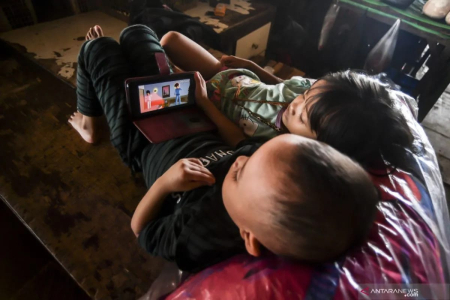

The number of internet user continues to surge. According to a recent report by social media management service We Are Social, global internet users reach 5.56 billion in 2025, out of a total global population of 8.2 billion at the start of 2025.
Indonesia has 221 million internet users or 79.5 percent of the total population. Thus, it is one of the countries with the highest number of internet users worldwide.
Recent data from Statistics Indonesia (BPS) in 2024 indicated that 39.71 percent of young children in Indonesia are mobile phone users, while 35.57 percent has access to the internet. Specifically, BPS’ 2024 data indicated that 5.88 percent of children under one-year-old use cell phones or gadgets, and 4.33 percent access the internet.
Alarmingly, 37.02 percent of children aged 1—4 and 58.25 percent of children aged 5—6 used cell phones. For internet access, the figures are 33.80 percent for children aged 1—4 and 51.19 percent for those aged 5—6. In underserved regions, children aged 13—14 are addicted to social media.
UNICEF data showed that globally, a child accesses the Internet for the first time every half-second. In Indonesia, internet users have reached 221 million, or 79.5 percent of the total population. Notably, 9.17 percent of these users are under 12 years old, making younger generations increasingly vulnerable to cyber threats.
According to Indonesia’s Minister of Communications and Digital Affairs Meutya Hafid, parents generally attempt to limit their children’s screen time. However, data reveals that 22 percent of children do not adhere to their parents' screen time rules.
Citing a survey from the National Center on Missing and Exploited Children (NCMEC), Indonesia currently ranks fourth globally and second in ASEAN for cases of child pornography in digital spaces.
President Prabowo Subianto instructed the Communications Ministry and related agencies to create age-restriction regulations for social media use to protect children's best interests and futures.
These regulations aim to protect children in digital spaces without infringing on their rights to express themselves and access age-appropriate information.
At least three regulations to protect children in the digital space are currently being formulated: a Draft Government Regulation (RPP) on Governance of Child Protection in the Implementation of Electronic Systems (TKPAPSE) by the Ministry of Communications and Digital Affairs; a Draft Presidential Regulation (RPerpres) on a Roadmap for Child Protection in the Digital Space (PARD) by the Ministry of Women Empowerment and Child Protection (PPPA), which is responsible for ensuring the rights and protection of children in all aspects of life; and a revision to Presidential Regulation No. 25 of 2012 on the Task Force for the Prevention and Handling of Pornography by the Coordinating Ministry for Human Development and Culture and the Ministry of Religious Affairs.
To coincide with the Safer Internet Month which is observed globally in February each year, Communications Minister Meutya Hafid affirmed that new regulations regarding child protection online would be announced soon.
During an event to commemorate the Safer Internet Day with Google Indonesia at her office in Jakarta on Tuesday, Feb. 18, 2024, she reassured the public, "The government will not remain silent. We have taken concrete steps to strengthen child protection in the digital world."
To curb digital threats, the Indonesian Communications Ministry removed 993,114 pieces of online gambling content between Oct. 20, 2024, and Feb. 15, 2025, and hundreds of thousands of pieces of pornography content between Oct. 20, 2024, and Feb. 15, 2025. However, these efforts are insufficient.
"Simply taking down content will not solve the problem of online gambling and other harmful content. Therefore, the government has strengthened Law No. 1 of 2024 on Electronic Information and Transactions by drafting governance for child protection in the implementation of electronic systems, which is now in its final stages. We have made a report to the President, and God willing, it will be officially announced shortly," she stated.
The Communications Ministry's unwavering commitment is evident: Indonesia is not just a market for global digital platforms. The ministry has engaged with major digital platforms such as Google and TikTok Indonesia to ensure their commitment to creating safer digital spaces for users, especially children. The government is actively developing regulations to close loopholes for platforms that violate these guidelines.
As of February 2025, the ministry began implementing the Content Moderation Compliance System (SAMAN). This application monitors and enforces compliance for private Electronic System Operators (PSE), particularly PSE for User Generated Content (PSE UGC), to maintain safe and healthy digital spaces, especially for children. SAMAN uses advanced algorithms to detect and remove harmful content, and it also provides a platform for users to report inappropriate content, thereby enhancing the safety of digital spaces.
PSEs that violate SAMAN will face reprimands, fines, and severe sanctions such as access termination or blocking. These measures are designed to ensure that PSEs take their responsibility for maintaining safe digital spaces seriously and to deter them from allowing harmful content to proliferate on their platforms.
Tips to Reduce Child Internet Addiction
According to the Health Ministry, gadgets and internet use in children can lead to addiction and affect their health. Gadget addiction can reduce sleep time, while adequate sleep is crucial for children's growth and development.
Parents play a vital role in addressing this phenomenon. They must be wise in introducing technology to children and ensure its use is balanced with other activities that support child development.
Here are some tips for parents to maximize the benefits of the Internet while minimizing potential negative impacts:
Writer: Kristantyo Wisnubroto
Editors: Untung Sutomo, Penny Rusman
Translator: RM Donum Theo KMP